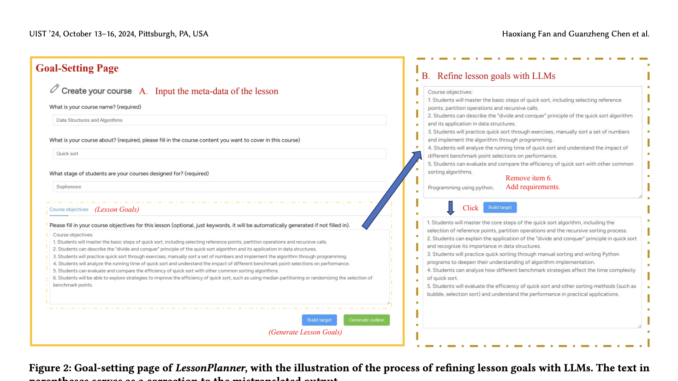
Integrating advanced educational technology has opened new avenues for enhancing teaching effectiveness, particularly using large language models (LLMs). These models are increasingly being explored as tools to assist educators, especially those new to teaching, in developing detailed and effective lesson plans. The application of LLMs in education is driven by the potential to generate tailored instructional content that adapts to various teaching scenarios, providing substantial support to educators who may lack experience or resources.
Novice teachers frequently encounter significant challenges in creating well-structured lesson plans. The core of the problem lies in their limited experience organizing instructional materials and applying pedagogical strategies effectively. This inexperience often results in inconsistent lesson quality and inefficiencies in lesson delivery. Curating relevant teaching resources is time-consuming and prone to producing suboptimal results, as teachers must sift through vast amounts of material to find content that aligns with their specific teaching objectives. These challenges can hinder the educational experience, making it difficult for teachers to achieve their instructional goals.
Traditional lesson planning methods typically involve referring to textbooks, consulting existing lesson plans, and searching online for relevant materials. However, these approaches are far from efficient. While they provide a foundation for lesson content, they often fail to address the needs of individual classes or the unique teaching styles of different educators. Teachers using generic LLMs, such as ChatGPT, usually find that while these tools can generate useful content, the outputs are fragmented and require significant refinement to be useful in a classroom setting.
Researchers from Sun Yat-sen University and Cornell University introduced LessonPlanner, designed to assist teachers, particularly novices, in constructing detailed and effective lesson plans. LessonPlanner is an interactive system that integrates pedagogy-driven content generation with the structured guidance of Gagne’s Nine Events of Instruction. This tool simplifies the lesson planning process and ensures that the generated content is pedagogically sound and tailored to the teacher’s and their student’s specific needs.
LessonPlanner allows users to input basic information about their course, such as the course name, lesson topic, and the student’s academic level. The system then generates a detailed lesson plan outline based on these inputs, guided by well-established educational theories. For example, Gagne’s Nine Events of Instruction, which includes strategies such as gaining attention, providing learner guidance, and eliciting performance, are integral to the plan’s structure. Teachers can then interact with the system to extend and customize the outline with specific activities and teaching materials. The tool also offers options to generate content, request explanations, and obtain suggestions for effectively delivering the lesson.
The performance of LessonPlanner was evaluated through a within-subjects study involving twelve participants and expert interviews with six novice teachers. The study revealed that LessonPlanner significantly improved the quality of lesson plans. Specifically, the system reduced the workload associated with lesson planning. The participants, graduate students or senior undergraduates, reported that using LessonPlanner made the lesson planning process more efficient and less stressful. On average, the quality of the lesson plans improved by over 30% when using LessonPlanner compared to traditional methods. The expert interviews underscored the tool’s usefulness, with novice teachers highlighting its ability to provide well-organized outlines and inspiring content.
In conclusion, LessonPlanner presents a promising solution to the challenges faced by novice teachers in creating effective lesson plans. By integrating large language models with pedagogical frameworks, the tool simplifies the lesson-planning process and enhances the quality of the resulting instructional content. The system’s ability to adapt to individual needs and user-friendly interface make it valuable for educators striving to improve their teaching effectiveness. With a notable increase in lesson quality and a significant reduction in preparation workload, LessonPlanner is poised to become an essential tool in the modern educator’s toolkit, particularly for those new to the profession.
Check out the Paper. All credit for this research goes to the researchers of this project. Also, don’t forget to follow us on Twitter and join our Telegram Channel and LinkedIn Group. If you like our work, you will love our newsletter..
Don’t Forget to join our 48k+ ML SubReddit
Find Upcoming AI Webinars here
Sana Hassan, a consulting intern at Marktechpost and dual-degree student at IIT Madras, is passionate about applying technology and AI to address real-world challenges. With a keen interest in solving practical problems, he brings a fresh perspective to the intersection of AI and real-life solutions.





Be the first to comment